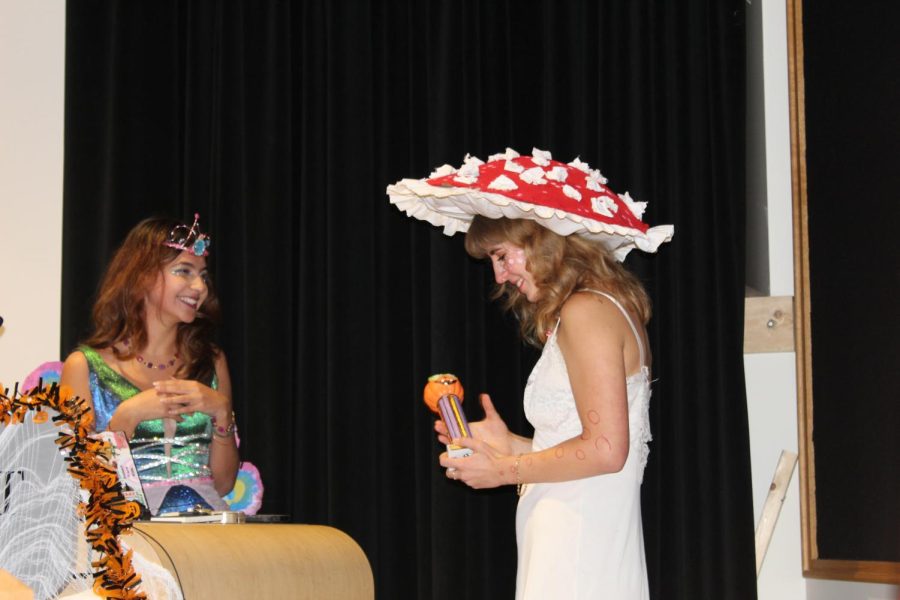Making Halloween fashion more sustainable
Wake Forest students are attempting to make Halloween, which usually creaste huge amounts of waste, into a more sustainable time of year
Students dress in sustainable Halloween costumes.
October 26, 2022
Before you order that wacky Halloween costume on Amazon this year, think about the 2,000 tons of waste in the UK alone that will be sent to landfills following this year’s Halloween festivities.
In light of this troubling statistic, one Wake Forest student is determined to lend a touch of green to all that orange and black this Halloween by holding the first-ever sustainable costume contest on campus on Oct 28, the Friday before Halloween.
“If for one day, I can get as many people as possible to wear a sustainable costume, ” senior Roxie Ray, organizer of the sustainable costume contest, said. “Hopefully, [the costume] waste [at Wake Forest] can be reduced by a significant amount.”
As a Sustainable Clothing & Style Intern in the Wake Forest Office of Sustainability, Ray wants the participants of the sustainable costume contest to perpetuate the idea of reusing clothes in different ways in their lives after their first wear.
“One of the main focuses I’ve had in promoting this event is trying to in engage students that aren’t typically engaged with sustainability, “ said Ray, “I am trying to change the narrative of sustainability, showing that it can also be really fun and exciting.”
The festive shopping frenzy of Halloween has left its spookiest aftermath in this most recent decade. The aforementioned 2,000 tons of waste is equivalent to 83 million plastic bottles, according to a study conducted by a London-based environmental charity, Hubbub. It takes 20 to two hundred years to decompose the polyester in the costumes.
The same survey revealed that 82.5% of Halloween costume materials contained plastic and that seven million Halloween costumes are thrown away each year.
While the exact corresponding statistic is unavailable in the US, the amount of waste is only scarier. Over 5.4 million kilograms of textile waste are produced by businesses and consumers throwing away Halloween costumes in the US every year.
With each passing year, Americans continue to spend more. According to a press release by National Retail Federation on Sept. 19, 2022, total Halloween spending across the US spiked to $10.6 billion, exceeding last year’s record of $10.1 billion. $3.6 billion of those dollars go towards costume spending.
Ray recognized the dark side of feverish consumerism associated with holiday celebrations, which is her primary motivation behind hosting Friday’s contest.
“At Wake, where people are relatively affluent, almost every day in a Halloween week, there is a different event, ” said Ray, “But I doubt people are going to change after the contest. So they will wear a sustainable costume to whatever parties they’re going to that night.”
According to Ray, contestants’ costumes are required to contain certain sustainable elements, which could mean either a component of the costume was purchased secondhand, or recycled from clothes that you already owned or borrowed from somebody else.
Students and faculty can enter the costume contest as an individual, a duo, or a group. Every contestant will be asked to come up on the stage and describe the sustainable component of their outfit. While they’re on the stage, the audience will vote on their favorite costumes on their phones, Ray said.
After running through everyone, an average of points for each contestant will be calculated and the winner will be announced. The winner gets to pick 10 people to enjoy a gourmet meal from Under the Oaks and the highly coveted pumpkin trophy.
“I’ve probably spent like 20 hours just on promoting,” said Ray with a proud smile, “I just went through the list of campus organizations and started emailing all of them.”
Though many will register on the day of the contest, a variety of student groups from Greek life like Chi Omega, to other student organizations like Girl Up and Wake Radio have already sent representatives.
“We are going to dress like frogs and toads because we all happen to have a lot of green and brown clothes, ” said Gretchen Castelloe, a Sustainability & the Arts Intern from the Office of Sustainability, “But we don’t have to go shopping for anything as we can just wear stuff that we already have.”
Castelloe also mentioned that some sorority members are planning to provide extra costumes for those who want to participate but don’t have one.
“I think that sustainability is becoming a bigger issue at Wake because the theme is getting trendy, ” said Castelloe, “The younger generations and the older generations are all aware that we should stop damaging the earth.”
Brian Cohen, assistant director for Sustainable Engagement in the Office of Sustainability, helps plan student initiatives like Ray’s costume contest. Cohen said that the power of popular culture has worked in favor of promoting the sustainable development of fashion, especially when it comes to practices like thrifting.
“The best thing to do when it comes to fashion is that most people make decisions based on what they think is popular,” said Cohen, “If we can elevate the profile of secondhand clothing to show how popular it is, it can win more people over. ”
The sustainable costume contest will be held in Pugh Auditorium at 5:00 pm on Friday, Oct. 28.
All are welcome to attend but must register beforehand on the link.














